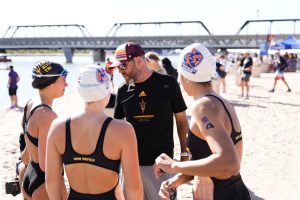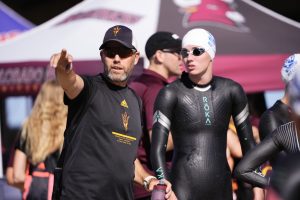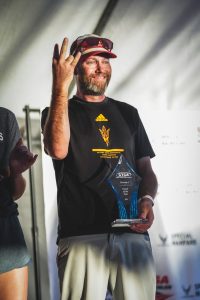- Slug: Sports-ASU English Triathlon Impact, 1,170 words.
- 3 photos available
By Brevan Branscum
Cronkite News
TEMPE – From coaching Olympic gold medalists to building a seven-time NCAA champion, Arizona State triathlon coach Cliff English’s resume might be as good as it gets.
In over 15 years of coaching triathlon at an international level before joining ASU, his professional triathletes won 278 races, including 23 Ironman wins, the ultimate accomplishment a triathlete can have. The four-time Olympic coach helped train Olympic triathletes such as Canadian Samantha McGlone and American Hunter Kemper.
In his time at ASU, the school has won seven national championships in the seven years of the team’s existence.
And yet, despite all of the success of his former triathletes, English’s contribution to the sport of triathlon goes far beyond anything that can show up on a stat sheet.
When he became the first head coach for ASU’s new women’s triathlon team in 2015, he exited the professional sphere and committed to building not only the Sun Devil program but also the sport across the country on the college level.
“It seems like wherever I’ve gone … I’m always able to build a program that’s top tier,” English said. “I guess that’s always been in my DNA, so I like the challenge of starting something. Something that is more than yours.”
ASU became the first NCAA Division I Power Five school to adopt women’s triathlon as a sport in 2015, about a year after the NCAA declared it as an emerging sport in 2014.
The NCAA required that 40 schools sponsor women’s triathlon at the varsity level within 10 years of the designation for it to become an official NCAA sport. However, with only a handful of schools including the sport at the time of the designation and few willing to take a risk, ASU and English stepped up.
Ray Anderson, then the athletic director at ASU, hired English to grow the sport. When Cal Poly Humboldt in Arcata, California, adopted triathlon in 2022, the sport reached the 40-school threshold, setting it on course to become an official NCAA sport in the near future. The sport couldn’t have met the requirement without English’s efforts.
“I always knew we had the task, we had to help grow this,” English said. “We really kind of took on that leadership role and that meant any school that is interested, we would reach out, we would share our budget, we would share how we did this.”
Out of the 42 schools that currently sponsor women’s triathlon, 14 are NCAA Division I athletic programs. English mentioned he’s taken schools including Arizona, TCU and San Francisco on tours around ASU’s facility. All three now sponsor women’s triathlon, and Arizona and TCU are the only other Power 5 schools with the sport.
Despite giving the competition insight into their process, the Sun Devils have not missed a beat since the team’s inception. The team has won seven consecutive NCAA championships, and the last six championship events took place in Tempe in and around Tempe Town Lake.
Despite their willingness to help other schools, the Sun Devils remain intent on beating all the newcomers and staying on top.
“We’ve got some incredibly young, talented women … they’re hungry, they want to carry on this tradition and this culture,” English said.
In collegiate triathlon events, athletes compete in sprint-distance races that include a 750-meter swim, a 20-kilometer bike ride and a 5-kilometer run. Races are often decided in the transitions between each of the disciplines, which means strategy and execution can be just as important as fitness.
That’s where coaching is so important, and even with new schools adding the sport to make it even more competitive, English’s squad keeps ticking off national championships.
“I’ve always had this mentality that you have to keep raising your bar,” English said. “I think we’ve done a really good job of that and we’ll keep doing that.”
English says he prioritizes depth on the team, as collegiate triathlon events are scored according to a school’s top five finishers. That mindset has led to ASU’s dominant streak, but it also can create pressure and competition between the athletes on the team.
English takes an athlete-friendly approach to coaching his team, and he especially emphasizes his athletes’ mental health. He says he helps however he can, and that includes open relationships between himself and the athletes and even having team psychologists to help them handle pressure.
“Through the years they always talk about the many roles of a coach. Do you, at some points, expand to your motivator, your comforter, your friend, your mentor?” English said. “You have to get to that point where your athlete recognizes in you that you are relatable and can help them get to a place of openness.”
According to Arizona State assistant coach and former ASU standout Kyla Roy, it’s English’s athlete-first approach that helped her when she was competing for the Sun Devils.
“Being a student-athlete is so hard, and I think there was a good balance between being an athlete and a student, which allowed me to excel in both,” said Roy, who was a First Team All-American honoree all five years at ASU and won the individual national championship in 2019.
The approach is what’s helped English achieve his career success. And as important as mental health is for him, maintaining his athletes’ physical health is just as critical.
“He’s very good at identifying what an athlete needs and then creating a training program that nurtures that,” said Leanda Cave, a former international star triathlete who placed fourth in the 70.3 World Championships in 2006 under English. “He manages to change and adjust the training to really suit every athlete’s physical ability but also mental ability.”
Cave started training under English in 2005 following some injuries, and she said his training program helped her recover and stay injury-free. She added that small aspects of training such as ice baths and diets, which coaches don’t usually pay attention to, were at the forefront of English’s regimen.
Cave went on to win 70.3-mile and full-distance Ironman World Championships later in her career. And even though she was on an entirely different level than English’s ASU triathletes, Cave’s confidence was still a priority for him.
“I had zero confidence about doing long-distance racing, but he managed to give me the confidence I needed to step up to the Ironman,” Cave said of the grueling full-distance test that includes a 2.4-mile swim, 112-mile bike ride and 26.2-mile run.
“And eventually, that’s what I ended up winning.”
English, who Cave described as a “pioneer” for NCAA women’s triathlon, has managed the impossible task of building a dominant program while helping the triathlon reach collegiate relevance. He’s helped schools adopt triathlon programs – and then he has gone on to beat those same programs.
Even though every year could be tougher than the last, English gladly welcomes the challenge.
“I always joke that, at one point, we’re going to stop doing that because every team is really figuring it out and getting a lot stronger,” English said. “The fight is definitely much tougher, so we have to make sure we stay on top.”
For more stories from Cronkite News, visit cronkitenews.azpbs.org.


